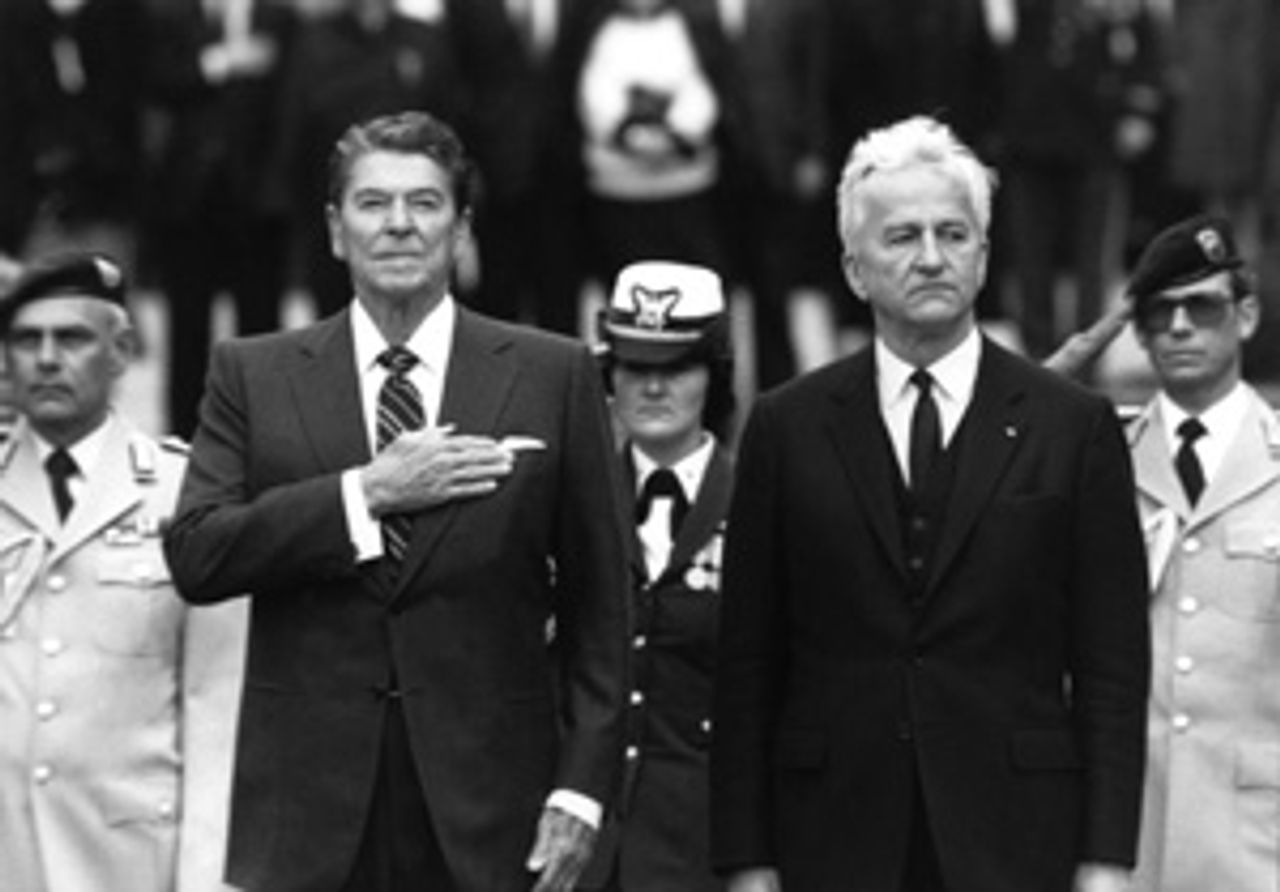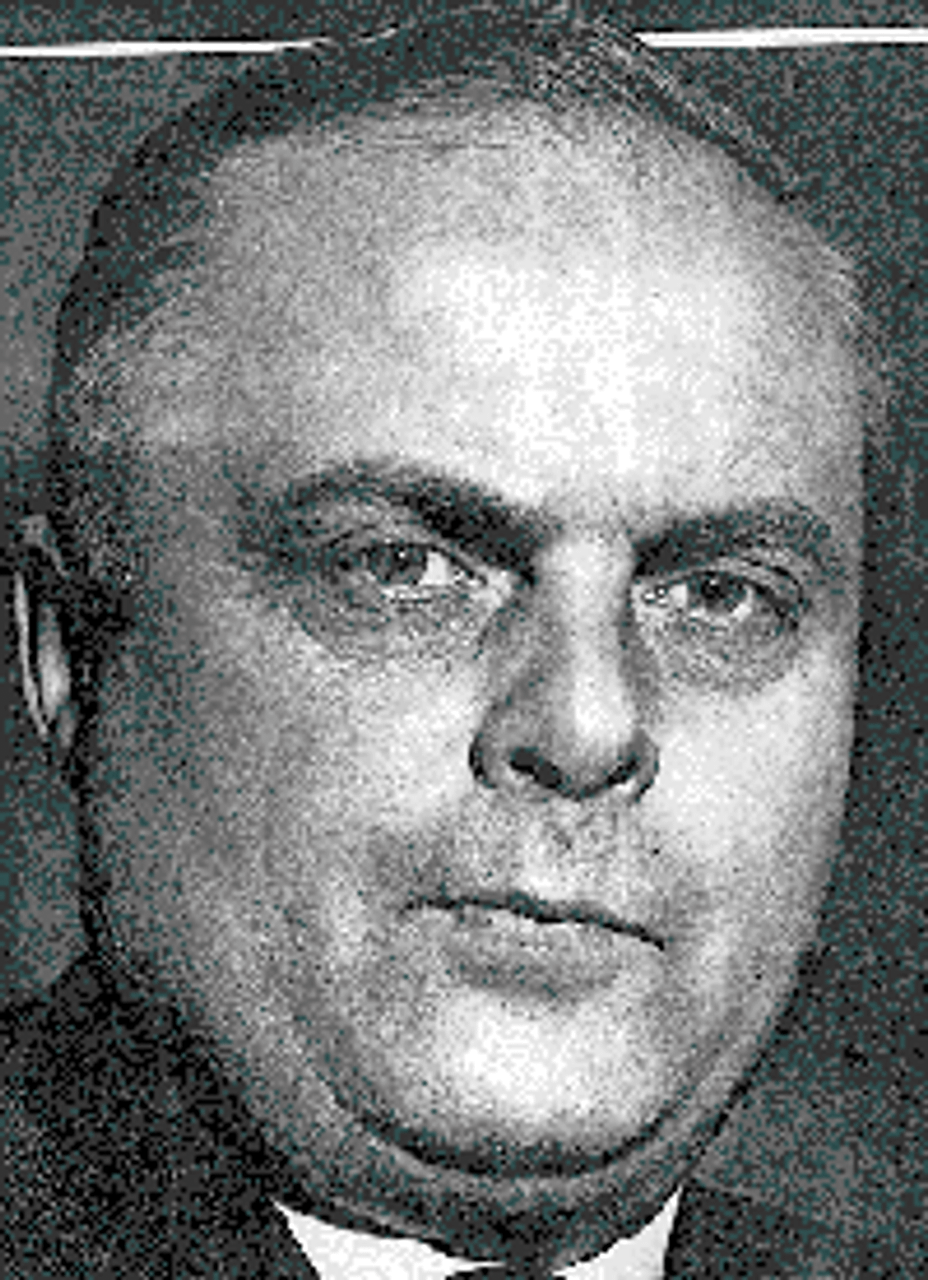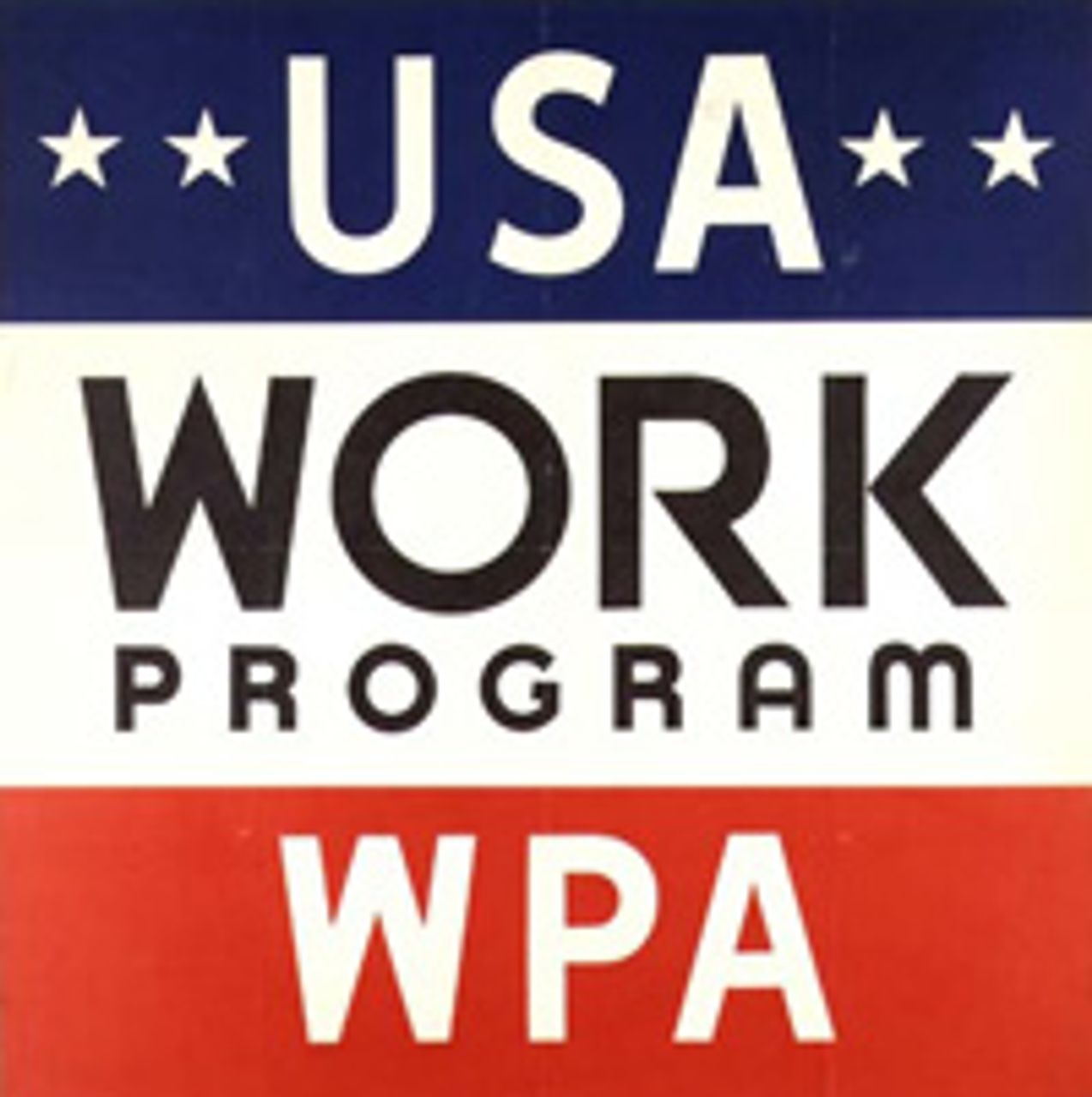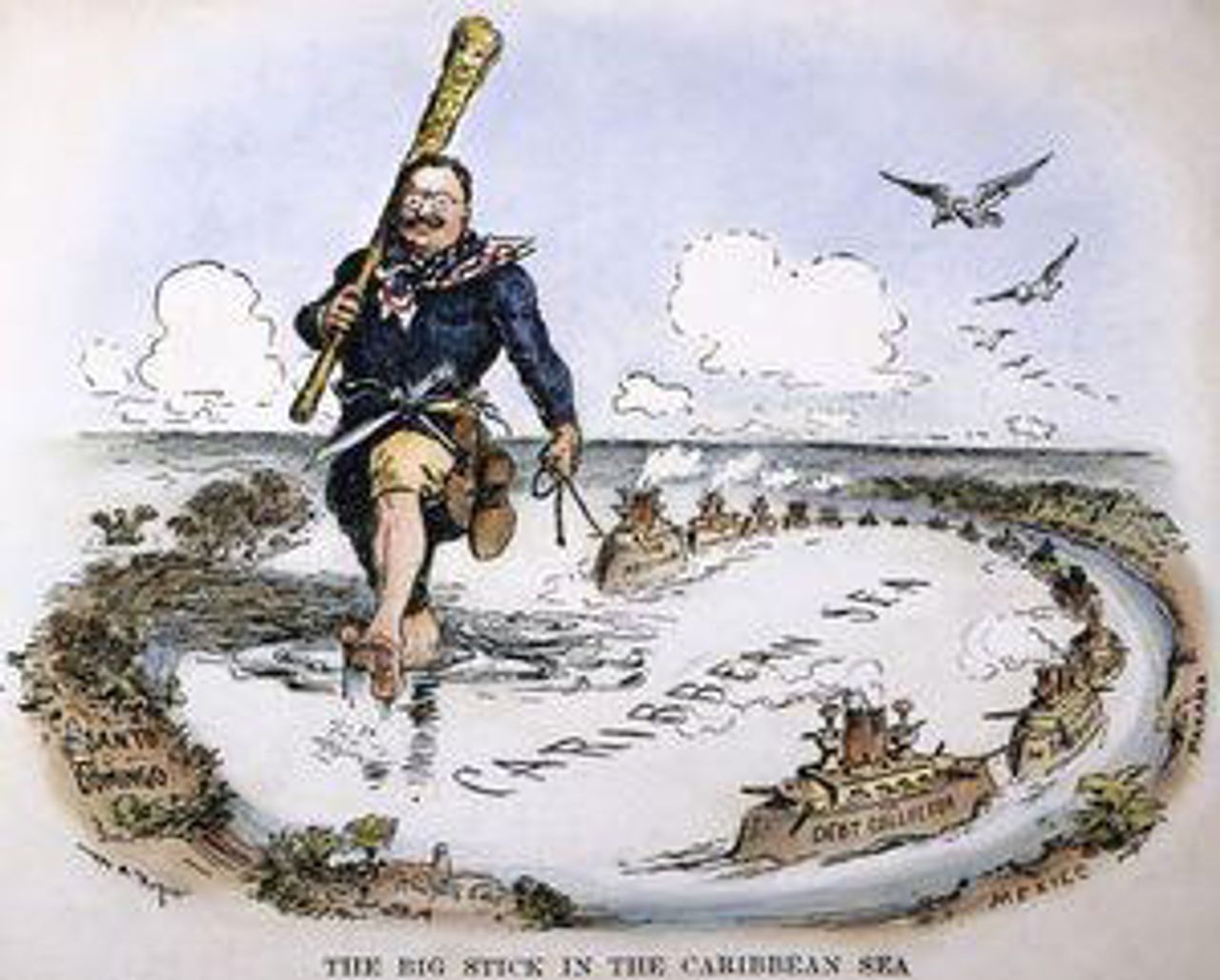This Week in History provides brief synopses of important historical events whose anniversaries fall this week.
25 Years Ago | 50 Years Ago | 75 Years Ago | 100 Years Ago
25 years ago: Reagan visits SS cemetery in Germany
 Ronald Reagan at Bitburg cemetery with German
Ronald Reagan at Bitburg cemetery with German President Richard von Weizäcker
US President Ronald Reagan provoked a major international controversy when he joined West German Chancellor Helmut Kohl to pay tribute at a military cemetery for German soldiers, including 49 members of the Waffen-SS, the Nazi paramilitary unit responsible for some of the most hideous crimes of WWII.
In defending the trip, Reagan declared that the SS soldiers buried there “were victims just as surely as the victims in the concentration camps,” and said that he felt no need to visit a concentration camp due to the “guilt feeling that’s been imposed upon” Germany. White House aide Patrick Buchanan said that Reagan would not bow before “Jewish pressure” to back out from the visit to Bitburg.
The visit first drew controversy when it was announced that during his trip to Germany Reagan had no intention of visiting one of the many concentration camps where the Nazi killing machine exterminated millions during WWII. After an international outcry, Reagan added a visit to Bergen-Belsen to his itinerary.
Kohl pressured Reagan to visit Bitburg as part of a broader strategy to rehabilitate the German ruling class’s Nazi past. In 1983, Kohl removed the veterans’ organization of the Waffen-SS from a monitored list of extreme right-wing organizations and refused demands from the opposition Social Democrats to proscribe SS reunions.
50 years ago: Ex-Nazi Theodor Oberländer forced from West German cabinet
 Theodor Oberländer
Theodor OberländerOn May 4, 1960, Theodor Oberländer, West German refugee minister, left office after revelations over his Nazi past became a political embarrassment for the government of Konrad Adenauer.
Prior to serving as Federal Minister of Displaced Persons, Refugees and Victims of War from 1953 until 1960—where he advocated citizenship for ethnic Germans from Eastern Europe—Oberländer was a longtime Nazi, participating in Hitler’s Munich Beer Hall Putsch in 1923, and officially joining the party in 1933, rising high in the Bavarian ranks of the party and the SA. Joining the Nazis opened up a professorship at the University of Greifswald, where Oberländer led efforts to drive Jews from both the school and the province of Pomerania.
After this, Oberländer became a leading advocate of the ethnic cleansing of Poles from Prussia and war against Poland. In this regard, Oberländer wrote, “The struggle for ethnicity is nothing other than the continuation of war by other means under the cover of peace... a struggle which goes on with one aim: extermination!” Oberländer was personally involved in the brutal invasion and occupation of the Ukraine, serving as an “ethnic psychologist” and advocating “pitilessly exterminating partisans.” Oberländer was accused of personally killing a female school teacher in the Ukraine.
Oberländer was a beneficiary of “denazification.” Taken prisoner at war’s end, US intelligence personnel found Oberländer’s anticommunism and knowledge of Eastern Europe valuable, and he soon found himself quickly promoted in Bavarian and West German politics. In 1959, East Germany (the DDR) launched a public campaign against Nazis in the West German government. Largely for public relations purposes, Oberländer left office in 1960, the same year the West German parliament dropped all prosecutions for Nazi crimes and killings apart from provable acts of murder.
75 years ago: WPA created to provide jobs for Great Depression’s unemployed
 WPA poster
WPA posterOn May 6, 1935, President Franklin D. Roosevelt issued Executive Order 7034 creating the Works Progress Administration (WPA) to provide jobs for millions of workers left unemployed during the Great Depression.
The executive order declared the aim of the WPA was to put millions then on relief rolls “to work on such projects or in private employment the maximum number of persons in the shortest time possible.” There were 20 million Americans on relief in 1935. Nearly 22 percent of the US labor force was unemployed in the previous year, 11,340,000 in all.
The program set aside billions of dollars to provide jobs on construction projects to build and expand the US infrastructure, creating highways, bridges and public buildings. The WPA program also set aside provisions for cultural development, employing thousands of visual artists, musicians and dramatists. The WPA employed more than 3.4 million people in all during its first year.
The WPA program was, along with the Social Security Act, one of the central features of Roosevelt’s “Second New Deal,” put in place to address the continuing social crisis of the Great Depression in the US and, ultimately, as an effort to rescue the profit system from the threat of a social revolution that had emerged the year earlier in a series of general strikes in major cities.
100 years ago: Former US President Theodore Roosevelt collects Nobel Peace Prize
 Cartoon of President Theodore Roosevelt’s
Cartoon of President Theodore Roosevelt’s “Big Stick” in the Caribbean
On May 5, 1910, former US President Theodore Roosevelt collected the Nobel Peace Prize, four years after winning it in 1906. He had deemed it improper for a president to accept the award while in office.
Roosevelt used his Nobel lecture to call for the strengthening of international treaties of arbitration and the Hague Tribunal, which he hoped would serve as a “Magna Carta for the nations” and be built up to “a species of world federation for international peace and justice.”
While Roosevelt hoped for peace among the Great Powers, he did not include “states so backward that a civilized community ought not to enter into an arbitration treaty with them.” (Roosevelt had declared British poet Rudyard Kipling’s call for the US to take up “the white man’s burden” to be “rather poor poetry but good sense from the expansion point of view.”) Roosevelt was indeed the foremost US advocate of imperialism, personally participating in the seizure of Cuba in 1898 from Spain and advocating the construction of a great navy to transform the US into a world power.
Roosevelt had won the Nobel Prize for his arbitration of the Russo-Japanese War, which had resulted in an ignominious defeat for the Czarist Empire and triggered the Russian Revolution of 1905. Roosevelt made clear in his 1910 acceptance speech that his primary concern was not peace among nations, but among classes. Peace, Roosevelt said, “is at least as necessary in the industrial world as it is among nations.” Putting on par the “the cruel greed and arrogance of part of the world of capital” with “the cruel greed and violence of part of the world of labor,” Roosevelt said he would turn his prize over to a body that would work toward “industrial peace.”
